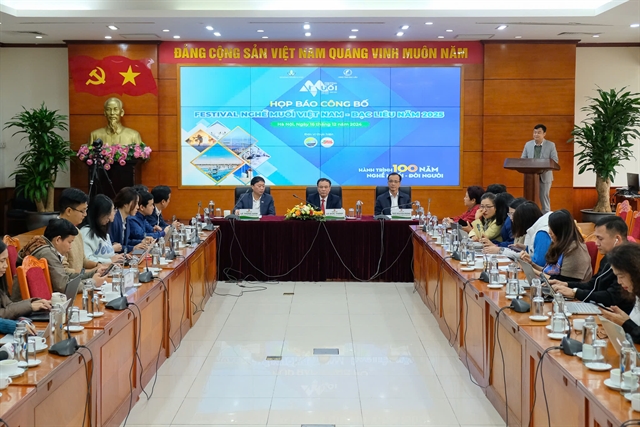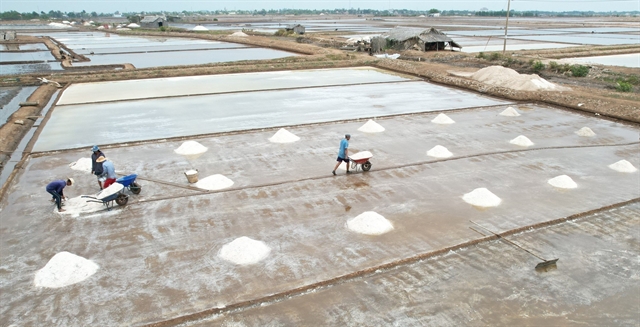The salt festival will also create a platform for exchanging experiences and knowledge in production, processing and trading salt products and OCOP (One Commune, One Product) products across provinces.

HÀ NỘI — Modern salt production models using scientific and technological advancements to improve productivity, quality and the overall value of salt will be introduced in a salt festival next year.
The Ministry of Agriculture and Rural Development, in collaboration with the People’s Committee of the southern province of Bạc Liêu, will organise the 'Vietnamese Salt Craft Festival - Bạc Liêu 2025: 100-Year Journey of Salt - Human Life' under the theme 'Enhancing the Value of Vietnamese Salt in Bạc Liêu Province 2025'.
The festival will also create a platform for exchanging experiences and knowledge in production, processing and trading salt products and OCOP (One Commune, One Product) products across provinces.
Lê Trọng Đảm, deputy dditor-in-chief of Nông Nghiệp Việt Nam (Việt Nam Agriculture) newspaper, said yesterday that salt production in Việt Nam is a long-standing traditional industry, playing an important role in both the economy and culture, especially in coastal provinces such as Thái Bình, Nam Định, Phú Yên, Ninh Thuận, Bình Thuận, Bà Rịa-Vũng Tàu, and Bạc Liêu.
Bạc Liêu, in particular, is considered the "salt capital" of Việt Nam, producing the largest output nationwide. It not only significantly contributes to the income of salt producers, but also creates a unique cultural identity for the region.
Salt festivals, along with stories and traditional experiences passed down through generations, reflect the deep spirit and cultural identity of this land.
Bạc Liêu salt is well known for its high quality, and has become an important export product.
However, salt production remains a fluctuating trade, increasingly losing its appeal for younger generations. Factors such as low income, harsh working conditions and the allure of other industries have made the younger generation less inclined to continue this craft.
The festival aims to honour, preserve and develop the salt industry, raising the value of Vietnamese salt production overall, and particularly Bạc Liêu salt.
The event seeks to inspire younger generations with the knowledge and skills to engage in production, business and entrepreneurship within the salt industry.
It will foster cooperation and linkages between salt production, processing and trading sectors and other industries such as the tourism, healthcare and culinary sectors.
Additionally, the festival will highlight the historical, cultural and heritage value of the salt industry in Bạc Liêu and participating provinces.

The event will promote salt and regional specialty salt products from various provinces, which is expected to boost production, business and the income of salt producers. This will encourage product diversification, increasing added value and production efficiency, while integrating tourism for sustainable development.
Bạc Liêu Province will showcase its economic, cultural and tourism potential, as well as its sustainable development prospects, at the festival.
Ngô Nguyên Phong, deputy director of the Bạc Liêu Department of Agriculture and Rural Development, said that the festival is an opportunity to honour the heritage of the salt industry while promoting its development towards modernisation and sustainability.
The event is expected to not only promote Bạc Liêu salt products and Vietnamese salt products, but also create momentum for economic, cultural and tourism connections. This will mark an important milestone in preserving traditions, enhancing the value of Vietnamese salt and upholding the salt industry’s position in domestic and international markets.
"The 'Vietnamese Salt Craft Festival - Bạc Liêu 2025: 100-Year Journey of Salt - Human Life' is an opportunity for Bạc Liêu to leave a good impression on residents and visitors while contributing to the economic, cultural and social development of the province. Most importantly, it will elevate the value of Vietnamese salt and specifically, Bạc Liêu salt," Phong said.
In Decision No. 1325, issued in August 2020, the Prime Minister approved the Development Plan for the Salt Industry for the 2021-30 period, which outlines goals to develop clean salt and traditional salt production, while strengthening the processing sector to make salt a trillion-đồng industry.
The plan aims to maintain a total salt production area of 14,500ha, producing 1.5 million tonnes annually by 2025. By 2030, this area will be reduced to 14,244ha, but production will increase to two million tonnes annually, meeting domestic demand.
Key industrial-scale salt production zones will be established in the south-central region. Technology and mechanisation will be applied to improve harvesting and post-harvest washing, increasing productivity by at least 30 per cent and stabilising salt quality to meet industrial requirements. By-products like gypsum and brine will also be used.
The Government has planned an estimated budget of VNĐ2.8 trillion (US$110 million) to develop the salt industry by 2030, of which about VNĐ1.9 trillion (68.69 per cent) will come from the central budget; VNĐ300 billion (10.6 per cent) will be allocated from local government programmes such as agricultural extension, industrial promotion, poverty reduction and new rural development initiatives; and VNĐ534 billion (18.9 per cent) will come from legal private sector contributions, including businesses, co-operatives and community participation. — VNS





